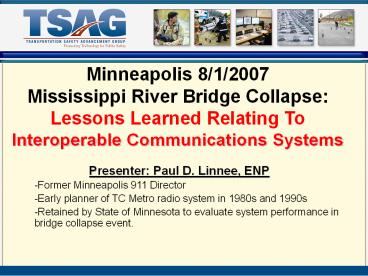Presenter: Paul D. Linnee, ENP
Title:
Presenter: Paul D. Linnee, ENP
Description:
Early planner of TC Metro radio ... Gorbachev visit to Twin Cities in 1990 was a catalyst ... Let cities and counties 'outstate' participate in the system ... –
Number of Views:87
Avg rating:3.0/5.0
Title: Presenter: Paul D. Linnee, ENP
1
Minneapolis 8/1/2007Mississippi River Bridge
CollapseLessons Learned Relating
ToInteroperable Communications Systems
- Presenter Paul D. Linnee, ENP
- Former Minneapolis 911 Director
- Early planner of TC Metro radio system in 1980s
and 1990s - Retained by State of Minnesota to evaluate system
performance in bridge collapse event.
2
My assigned topic is the radio communications
system that was in place on 8/1/07 for this
incident.
- What well cover in this presentation
- History and technology basics
- Planning process for interoperability
- Subscriber profile and all-inclusiveness
- Ownership and governance
- Standards and training
- Redundancy
- How the system performed
- Lessons learned
3
System history technology basics
- Today, the radio system is called ARMER. Its a
region-wide (going statewide) 700/800 MHz digital
trunked radio system. - Grass roots cooperative and local planning for
ARMER began in 1989 - Gorbachev visit to Twin Cities in 1990 was a
catalyst - Very little 800 MHz or trunked radio in area then
- Legislation was passed in 1995
- Created Metro Radio Board dominated by local
elected officials - Established initial funding base
- A whopping 4 cents per month on state-wide 911
surcharge - All agencies/All Services concept from day one.
- Build a thin blanket for state/regional mobile
radios first - Add sites to it to enhance coverage for local
users - Build in links to outside systems from day one
4
- Locals were then able to crawl under this thin
blanket infrastructure at no cost, if the
regional systems coverage served their needs. - If locals wanted better coverage or more
capacity, they could fund local enhancements to
the regional system. Most did. - Now, all public safety in all 7 metro counties
are on the system all state and regional
agencies in the metro area. - Most (but not all yet) local public works/service
agencies are on too - About 22,000 radios are subscribed to the system
- Complex talk-group plan with groups of
interoperability talk-groups set aside by
service, county, entity. - Access priorities assigned by talk-group type
very important _at_ bridge!
5
- A few years back, the State decided to migrate
the system out to be a full statewide system for
state agencies. - Let cities and counties outstate participate in
the system - Legislature established Statewide Radio Board
(SRB) which now manages the system. - The SRB is still dominated by local members.
- Collaborative planning has been the hallmark.
- Migration to the system statewide is voluntary
(for locals) but looks like it will be universal
and probably be done by 2013 or so.
6
- The MRB/SRB worked from the ground up to create
standards for system use admin. - Who can be on the system, what they can use it
for, etc. - The MRB/SRB created training programs and
standards for all user agencies. - Very robust redundancy was built into the
system.
7
Redundancy Where was the bridge?About the best
location we could have hoped for.Right in the
heart of our heaviestcoverage andcapacity
areas
8
- Where was redundancy?
- 2 Redundant system controllers
- Microwave loop to the north
- Microwave loop to the south
- Fiber across river
- UNDER THE BRIDGE THAT JUST FELL!
- But not a problem, as redundant route took over
- Note Shadings do not represent site coverage
9
Technical Briefing
- The system infrastructure is a Motorola Astro 25
digital 700/800 MHz trunked radio system, with
several simulcast zones and some non simulcast
areas. - There are now over 25,000 subscriber radios on
the system from Motorola, E.F. Johnson, Kenwood,
Tyco and Thales. - There are several dozen dispatch/control points.
- This is decreasing with statewide and metro
roll-outs
10
More background
- August 1, 2007
- Temp that day got up to about 99 degrees
- 605 p.m.
- Rush hour traffic on approaches to Interstate 35W
bridge over Mississippi in downtown Minneapolis - Maintenance work active on the bridge added lots
of extra weight, but reduced vehicles on the
bridge - Heres an 11 minute video that tells the rest
11
Review of key data points
- Many years of ground-up highly collaborative
planning. - Commitment to an everything with a tax exempt
plate user population. - Commitment to creating an everyday radio system
that would fulfill all inter-op needs. - Ground-up planning of talk group layout and
pre-planned usage. - Still, there were training shortcomings
- Some users not well enough acquainted with the
concepts and application of talk group
priorities.
12
Review of key data points
- System utilization doubled in the 1st hour after
the collapse. - 170 response agencies, 12,895 radios active in
the metro area. - 27,732 push to talk actions from 7- 8 p.m.
- 2,572 minutes of airtime used 7-8 p.m.
- Only one instance occurred where a radio
operating on a Priority 3 or higher talkgroup
received a busy for more than 10 seconds, and
that was for 15.1 seconds. - Some users accessing lower priority talk groups
experienced longer access delays (as they should,
according to the plan).
13
For further information
Access the complete performance review report
at http//www.srb.state.mn.us/pdf/I-35W20Final2
0Report.pdf Contact ARMER system Manager Scott
Wiggins, MN Public Safety Dept. 651.201.7546 or
scott.wiggins_at_state.mn.us Contact Paul
Linnee 612.869.6164 or paull911_at_aol.com































